When I was a little girl, I used to work out in the garage with my dad. He loved to fix up cars and had a big garage where he could pull them in and continue to work on them. I used to hand him tools, or hold the flashlight. I’m sure I talked non-stop and asked tons of questions, but I was also learning. I can’t say that I have replaced a motor in a car, but I have seen it done.
The interesting things is that even though this task involves detailed work, my dad has had extremely poor eyesight since he was a young child, due to a hereditary disease, which continued to get worse as he aged. He’s now legally blind. I never really considered how difficult some of his daily tasks must have been, or why he got so frustrated when Mom moved things around on him. I knew he had poor eyesight, but I didn’t know that it was different than other people. Reflecting back, I now see that he had found ways to adjust that made everything seem normal to me. So normal, I didn’t even notice the adjustments he would make, like always ordering the special instead of trying to read the menu, or asking me what that person is doing over there.
Later in life, I dated and later married a do-it-yourself man. Even though he didn’t particularly enjoy working on cars, he did it. And, being the doting girlfriend and wife that I am, I helped him with it. I got him tools, I held the flashlight, the same things I had done with dad.
One time when I was helping my husband work on something with the car, he was getting so frustrated and literally had himself bent up into a pretzel trying to get under the car the right way to see where a bolt went. It looked so strange to me. My dad never had to contort himself to put the car back together. I couldn’t understand what was going wrong.
I ended up helping him, just as my dad had taught me. Almost staring off into space, I reached underneath the car and felt for the hole he was looking for. Then I was able to get the bolt in the right spot, something he had been trying to do for quite some time…no contortions needed.
This was the first time that I realized not everyone knew how to feel what they were doing. Most people, or shall I say, most people with good eyesight, relied on what they could see. When they couldn’t get their eyes on something, or their vision wasn’t working, they struggled. But this was an adaptation my dad had mastered. He didn’t rely on what he could see, it relied on what he felt.
Why am I telling you this story?
In many conversations I have had with people, trying to understand their goals and vision for the future, people regularly tell me, they just can’t ’see’ it, and if they can’t see it, it’s must not be real.
I want to encourage you to think about vision differently. Instead of trying to paint a picture of every detail, and see the pieces coming together, focus on how you will feel. Use the power of your emotion to give you the fuel to work towards a goal that you can’t put your eyes on.
I recommend the approach I learned from my vision impaired dad. Stop trying to see what you are looking for and feel your way instead. You will likely find your intuition and emotions will lead you down the right path every time.
How does your vision feel?


